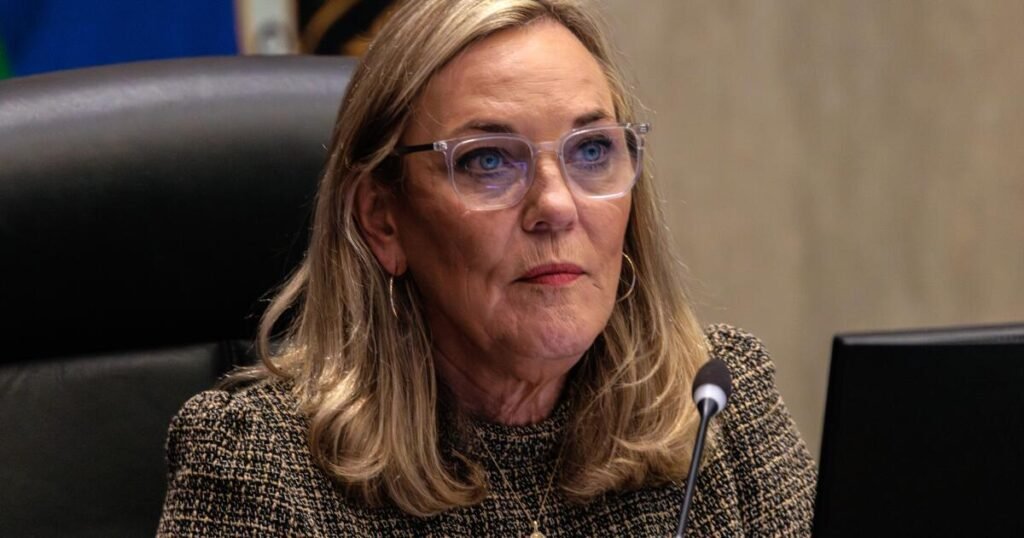Investigation Launched into $4 Billion Sexual Abuse Settlement in Los Angeles County
On Tuesday, Los Angeles County initiated an investigation to determine whether the record $4 billion sexual abuse settlement, approved earlier this year, may have been compromised.
The county supervisors unanimously backed a motion requesting the county attorney to explore possible misconduct among “legal representatives” tied to the increase in sexual abuse lawsuits against the county. Additionally, the county auditor’s office plans to set up a hotline specifically for public tips related to the case.
Superintendent Kathryn Berger, who called for the inquiry, expressed her distress, stating, “It’s horrifying and upsetting that someone would try to exploit a system designed to bring justice to victims of child sexual abuse.” She emphasized the need to prevent such occurrences and ensure that all funds for victims reach the survivors directly.
Berger shared her sentiments with the Times, stating she felt “incredibly upset and frankly disgusted.” A report released last week revealed allegations from seven plaintiffs involved in the largest sexual abuse settlement in U.S. history, claiming they were incentivized by recruitment agencies to sue the county. Two individuals reported being prompted to fabricate abuse claims, with some asserting they received monetary compensation in a social services office in South Central Los Angeles.
All individuals alleging to have received money from recruiters were represented by Downtown LA Law Group (DTLA), which managed over 2,700 plaintiffs in the settlement. DTLA has denied any connections to the recruiter, while attempts by the Times to reach the recruiter for comments were unsuccessful.
A statement from the company clarified: “We do not pay customers to litigate, and we strongly oppose such actions. We want justice for the real victims.”
The county had committed to a $4 billion payout to resolve thousands of lawsuits filed by those claiming abuse during their time in foster care and juvenile detention facilities. This legal action was prompted by a 2020 law that updated the statute of limitations, allowing victims a new opportunity to file claims.
As a result, most county departments faced budget cuts to cover the settlement costs. Superintendent Holly Mitchell noted the “painful irony” that many petitioners were seeking assistance from the South Central Department of Social Services, which is currently anticipating layoffs.
“We are not an ATM machine,” Supervisor Hilda Solis remarked. “We are a safety net.”
The Times reported that many attorneys involved in these cases could receive 40% of their clients’ settlements. Berger expressed her shock at the potential for over $1 billion of taxpayer money to be directed toward law firms.
“I very much doubt that any of these lawyers understand the depth of what they’ve done,” Berger commented, indicating that it could significantly affect county operations.
The motion passed on Tuesday now instructs the county attorney to seek law enforcement assistance “as appropriate” and consider referring the allegations highlighted in the Times report to state court.
California lawmakers, union leaders, and influential legal organizations have also urged investigations into these matters.
The state court has opted not to comment on the possibility of an investigation while affirming that California law generally prohibits customer solicitation or payment for procurement, a practice referred to as capping.
Several supervisors expressed frustration over the 2020 law changes, indicating it was poorly drafted and caused substantial financial strain on counties. Many local districts have echoed this sentiment, lamenting their inability to contest decades-old lawsuits, especially since records about minors have to be destroyed for privacy concerns. This often leaves lawyers without documentation to validate claims of abuse.
This law, sponsored by Lorena Gonzalez, a former legislator now leading the California Federation of Labor, has prompted Berger to label it the “Gonzalez bill.”
“I call it the status quo,” she remarked, highlighting the challenging financial situations many school districts find themselves in statewide. “Maybe it’s time for all of us to come together and figure out how to clean up the mess that Gonzalez’s bill has caused.”
Gonzalez has noted her belief that attorneys representing plaintiffs have taken advantage of her legislation and is advocating for new laws that would better enable local jurisdictions to defend themselves. She reiterated her commitment to protecting genuine victims while insisting that the law doesn’t alter the burden of proof.
“What, are they just angry because they can’t do their due diligence?” she questioned. “They are shirking all their responsibility in this matter. I’m making it clear that changes should be made. They should make it clear that they have probably not met their burden of proof.”
Last week, some county unions and lawmakers raised concerns regarding whether county attorneys properly vetted abuse allegations before agreeing to a multi-billion-dollar settlement. Supervisors met privately with county attorneys on Tuesday to discuss how these allegations were assessed.
“Did we do depositions? Did we do due diligence?” Supervisor Janice Hahn inquired, questioning the actual responsibility of thoroughly reviewing each case.
Supervisors stressed that they believe the settlement includes many valid claims and are committed to ensuring that victims receive compensation for the abuse suffered at the hands of county personnel.
Numerous victims shared their harrowing experiences with the Times. One recalled being threatened with sexual abuse by probation officers decades ago and faced solitary confinement if he reported anything to higher authorities. Interviews with several victims revealed collusion with abusive staff members at the now-closed McLaren Children’s Center, a county-run facility in El Monte.
“We have to truly reach the people who have been affected,” Supervisor Lindsey Horvath stated. “These funds should go to survivors, not individuals or organizations seeking to profit from someone else’s suffering.”







